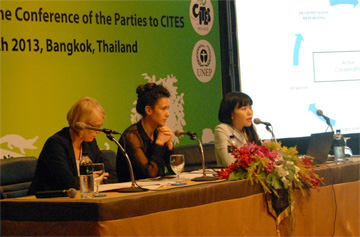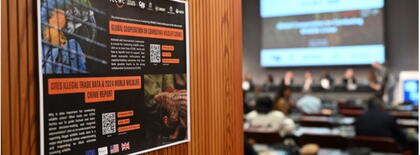
Cutting-edge training in investigation techniques has been delivered to wildlife law enforcement officials across Asia, helping them in their battle to halt transnational organized wildlife and forest crime.
Over the past few years, there have been a number of successful seizures and arrests of wildlife traffickers at airports, seaports and border crossings in Asia, Africa and other regions of the world. These typically result from risk analysis or actionable intelligence of an individual traveling with illegal wildlife such as ivory tusks or rhino horns, or of a larger shipment containing several tons of illegal wildlife products. The individual is usually arrested and the illegal goods are seized. This event focused on measures to investigate the sophisticated criminal networks behind these crimes and the special investigative techniques that need to be used.

Today, law enforcement officers from across Asia are better-equipped to make use of – and successfully apply – innovative and specialized investigative techniques such as controlled deliveries to combat transnational organized wildlife and forest crime.
Specialist training was delivered on 12 March by the International Consortium on Combating Wildlife Crime (ICCWC) at a symposium organized by the Asian Development Bank (ADB) alongside the 16th meeting of the Conference of the Parties (CoP16) in Bangkok, Thailand.
The training focused on specialized investigative techniques including controlled deliveries, information and intelligence management, and tools such as anti-money laundering and asset recovery, that can be used by wildlife law enforcement officers to combat wildlife crime more effectively, and to ensure that wildlife criminals and the organized wildlife networks that are involved in the illegal trade are brought to justice.
The conference also examined innovative tools and strategies that can be used to counter transnational organized wildlife and forest crime, such as the ICCWC Wildlife and Forest Crime Analytic Toolkit.
The symposium brought together senior judiciary, prosecutors, police and customs officers and key decision makers and was held from 10 to 12 March 2013. The event was led by the ADB, in close collaboration with ICCWC partners, namely the CITES Secretariat, INTERPOL, the United Nations Office on Drugs and Crime (UNODC), the World Bank and the World Customs Organization (WCO). The aim of the conference was to secure cooperation throughout the law enforcement chain and among countries in Asia to combat the illegal wildlife trade by upholding the rule of law; promoting integrity and increased action to combat the illegal trade. It also examined how to strengthen national policies and legal frameworks to curb the illegal trade to more effectively arrest, investigate and prosecute wildlife criminals.



